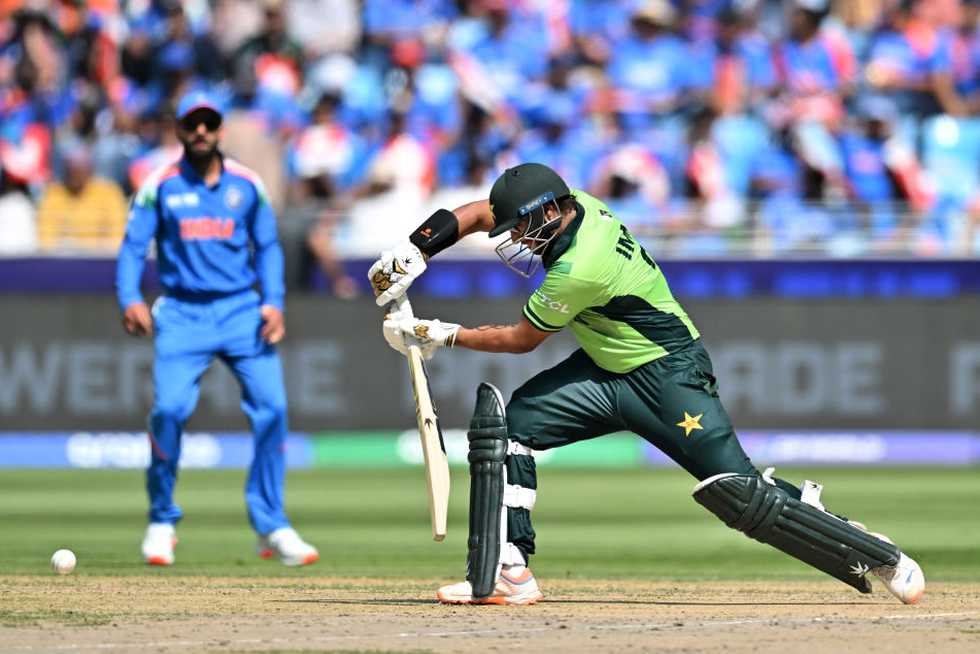

"Intent" is cricket's most overused buzzword, an easy narrative often deployed lazily, a shorthand analysis that explains everything and nothing at once. Yet, in Pakistan's particular case, intent genuinely is missing. It occasionally emerges - not by design, but by accident. Usually, one player breaks away from cautious team instructions, following their personal instinct, as Fakhar Zaman or Saim Ayub have done at times. But both are now injured, and in their absence, logic dictates the rest of the line-up should collectively lift their strike rates to compensate. Instead, Pakistan continue their cautious approach, stubbornly refusing to adjust.
After Pakistan's 2023 defeat to India, a couple of Indian players in an interview openly remarked how comfortable they felt watching Pakistan show no intent against their spinners. Despite Pakistan forming a seemingly steady partnership, reaching 150 with only two wickets lost, their approach was openly questioned by their opposition. Fast forward to 2025, and nothing has changed. Another game against India, another comfortable Indian victory. The uncomfortable truth is clear: Pakistan cricket isn't learning.
There is always something familiar about Pakistan's defeats in ICC events - something repetitive, something stubbornly resistant to correction. It's not just the fact of losing; rather, it is the nature of these losses, the timidness, the caution, the reluctance to acknowledge the demands of contemporary cricket. Against India, once again, Pakistan reverted to a painfully outdated, unsustainable mode of cricket - a cautious game that stands increasingly obsolete.
Skill gaps exist. India's players, individually and collectively, possess superior skills - this much is obvious. Yet that is not, in itself, the root problem. If skill was all that mattered, Pakistan would never win against such sides. But intent, ambition, the willingness to embrace risk and aggression - these are factors entirely within a team's control. And bizarrely, in an age when intent is not merely beneficial but mandatory, Pakistan continues to shy away.
This approach - preserving wickets, cautiously building innings - is outdated in an era defined by relentless, proactive cricket. The logic is simple: when your opponent possesses more skill, the rational response isn't to shrink; it's to meet them with greater aggression, with bolder strokes. Instead, Pakistan seems determined to fight fire with caution, a strategy increasingly baffling and unsustainable at the highest levels.
This issue runs deeper than just the players on the field. Pakistan's cricket culture has made a habit of celebrating bilateral series wins as ends in themselves. While other nations use such series to build depth, test new combinations, and nurture talent, Pakistan treats every white-ball bilateral series victory as if it's a decisive triumph. Short-term results are glorified, bench strength development is ignored, and the core issue of approach and intent is never discussed meaningfully.
And when these big-event losses inevitably occur, the reaction is reductive and predictable: coaches are fired, selectors dismissed, captains questioned, and camps hurriedly organized as if repetition alone will magically fix structural flaws. Players are blamed as individuals, but the collective approach is rarely, if ever, genuinely reconsidered. Even when it does come up, intent and tactical mindset are often secondary talking points, overshadowed by narratives around fitness or skill training, convenient scapegoats that shift the focus away from fundamental truths.
Cricket in 2025 demands intent first, everything else second. The great irony is that a team lacking superior skills, as Pakistan often is relative to its fiercest competitors, needs intent more urgently, not less. Higher intent masks technical imperfections, overcomes skill gaps, and builds scoreboard pressure, as teams with far fewer resources regularly demonstrate. Pakistan, somehow, defy this logic, matching inferior skill with inferior intent, an equation whose only result is predictable disappointment.
What Pakistan cricket needs isn't another knee-jerk reaction, another overhaul of personnel, or more frantic camps. What it needs is a thorough, honest reconsideration of its white-ball philosophy. Anything short of this will keep producing the same results, and worse, the same confused conversations after each failure.
Until intent becomes the first word, not an afterthought, Pakistan's defeats will keep repeating themselves.
| Share | Tweet |





